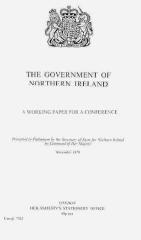 CAIN Web Service
CAIN Web Service
The Government of Northern Ireland
- A Working Paper for a Conference (1979)
[CAIN_Home]
[Key_Events]
[Key_Issues]
[Conflict_Background]
Government Reports and Acts
Text: NIO ... Page Compiled: Fionnuala McKenna
 The Government of Northern Ireland
The Government of Northern Ireland
A Working Paper for a Conference
Presented to Parliament by the Secretary of State for Northern Ireland by Command of Her Majesty
November 1979
Published in London by,
HER MAJESTY'S STATIONERY OFFICE, 1979
Cmnd. 7763
ISBN 0 10 177630 6
Copyright notice:
Crown copyright material has been reproduced under licence from the Controller of Her Majesty's Stationary Office.
End-Users may access the Material and download it onto electronic, magnetic, optical or similar storage media provided that such activities are for private research, study or in-house use only.
End-Users must not copy, distribute, sell or publish the material.
CONTENTS
INTRODUCTION
THE SCOPE OF THE CONFERENCE
THE TASK OF THE CONFERENCE
A: Institutions
B: Powers to be Transferred
C: The Exercise of Powers and the Role of the Minority
QUESTIONS FOR DISCUSSION
APPENDIX A: Illustrative Models of Systems of Government
APPENDIX B: Functions of Northern Ireland Departments
THE GOVERNMENT OF NORTHERN IRELAND
A Working Paper for a Conference
INTRODUCTION
1 . For several years the people of Northern Ireland have
lived under a system of "direct rule" from Westminster.
Under this system no significant responsibilities are discharged
by locally elected bodies. This has left the people of Northern
Ireland with less responsibility for their own affairs than is
the case in any other part of the United Kingdom. While these
arrangements may be accepted in Northern Ireland as "second
best" they are not satisfactory as a continuing basis for
the government of the Province. Her Majesty's Government is therefore
seeking a transfer of responsibility which will serve the best
interests of Northern Ireland. Such a transfer cannot and must
not be frustrated by terrorism
2. On 25 October 1979 the Secretary of State for Northern Ireland
announced that the Government would put to Parliament at an early
date proposals for transferring to locally elected representatives
some of the powers of government in Northern Ireland at present
exercised from Westminster. To that end a Conference of the main
political parties would be convened so that the Government might
proceed with the highest possible level of agreement.
QUESTIONS FOR DISCUSSION
39. The following questions, which arise from the issues considered
earlier in this document and from the "model" systems
of government illustrated in Appendix A, are set out as a framework
or agenda for the Conference. It will be the Government's aim,
in discussion and negotiation with the political parties in Northern
Ireland at the Conference, to secure the highest level of agreement
possible in providing the answers to these questions, so that
the Government can then take the decisions on which to base legislation
for a transfer to the people of Northern Ireland of greater responsibility
for the conduct of their affairs.
Institutional Framework
1. Should there be one elected body, or more?
2. What should be the method of election of the elected body
or bodies?
3. In the case of one body, should there be one chamber or two;
and if two, how should the upper chamber be chosen and what powers
should it have?
4. Should the Executive be "cabinet-style" or "committee-style"?
5. What part (if any) should committees play in legislative or
executive decision-taking; could they have an investigative or
advisory function?
Powers to be exercised
6. Should the range or number of functions transferred be on
the 1973 scale or more limited?
7. what should be the extent of the powers transferred: legislative
and executive, or executive only?
8. If legislative, should they extend to primary legislation
(subject to over-ride by the Westminster Parliament) or only to
subordinate legislation?
9. If executive powers only are transferred, ie. On local government
lines, should they be confined to management or include responsibility
for policy within a legislative framework?
10. How much financial power should be given to the elected body
or bodies, and to the executive, as regards (a) the raising of
revenue and (b) deciding how the available resources should be
distributed?
Role of the Minority
11. What are the best arrangements to take account of the interests
of the minority community in the decision-taking, whether legislative
or executive: for example, should a proportion of posts be reserved
to their representatives or should certain posts and/or decisions
require approval by a weighted majority vote?
12. Should there be an established right of appeal by minority
groups in the elected body (or bodies) to a higher authority to
"override" or blocking powers?
| 
